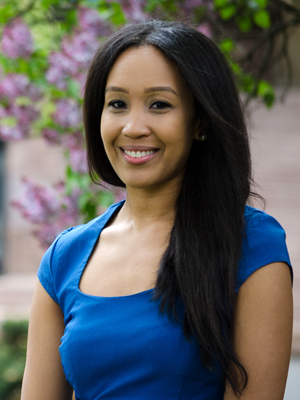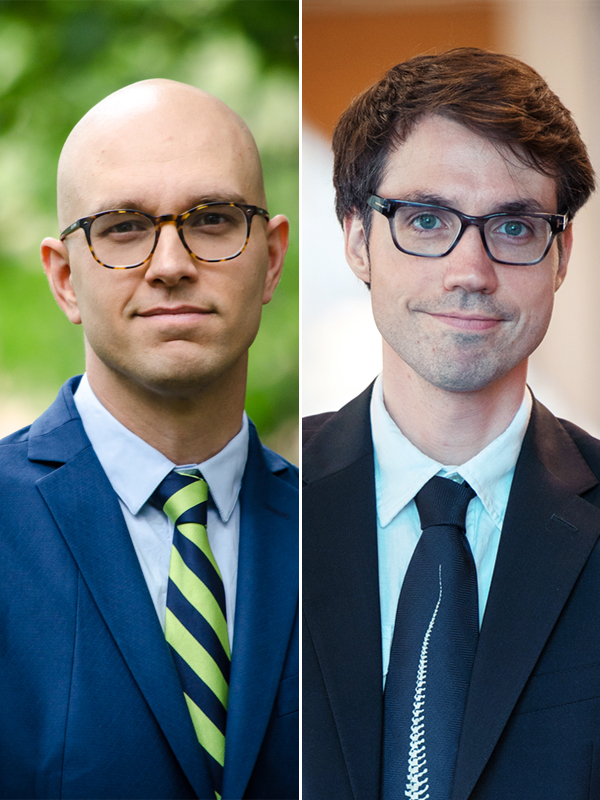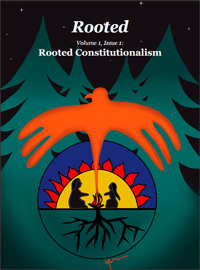New hires and promotions

Renouvellement académique à la Faculté de droit
Quatre personnes rejoindront notre corps professoral pour l’année universitaire 2021-2022.
Priya Gupta commencera un mandat de professeure associée à la fin de son mandat d’un an à titre de Boursière Wainwright senior. Joshua Nichols rejoindra la Faculté en tant que professeur adjoint et Darren Rosenblum en tant que professeur/e titulaire. Finalement, Sarah Riley Case entamera un mandat en tant que Boursière Boulton junior avant d’accéder au rang de professeure adjointe en août 2022. Lire l’annonce.
Kimberly Lee-Louis joins the Faculty of Law
 This spring we welcomed Kimberly Lee-Louis, BCL/LLB’13, as inaugural Assistant Dean (Inclusion – Black and Indigenous Flourishing). Lee-Louis will play a leadership role in our collective efforts towards recruiting and supporting Black and Indigenous law students.
This spring we welcomed Kimberly Lee-Louis, BCL/LLB’13, as inaugural Assistant Dean (Inclusion – Black and Indigenous Flourishing). Lee-Louis will play a leadership role in our collective efforts towards recruiting and supporting Black and Indigenous law students.
Reporting to the dean, Lee-Louis will collaborate with academic and administrative staff and students to advance and implement McGill’s Action Plan to Address Anti-Black Racism 2020-2025 and McGill’s Equity, Diversity & Inclusion (EDI) Strategic Plan 2020-2025 within the Faculty of Law and in our surrounding communities. Read the announcement.
Sébastien Jodoin et Jonas-Sébastien Beaudry promus au rang de professeur agrégé
 Titulaire de la Chaire de recherche du Canada sur les droits de la personne, la santé et l’environnement, le professeur Sébastien Jodoin s’intéresse aux grands thèmes de la relation entre les droits de l’homme et la crise climatique, le droit et les politiques climatiques transnationales et comparées, et le rôle des droits des personnes handicapées dans la résolution de problèmes environnementaux et de santé complexes.
Titulaire de la Chaire de recherche du Canada sur les droits de la personne, la santé et l’environnement, le professeur Sébastien Jodoin s’intéresse aux grands thèmes de la relation entre les droits de l’homme et la crise climatique, le droit et les politiques climatiques transnationales et comparées, et le rôle des droits des personnes handicapées dans la résolution de problèmes environnementaux et de santé complexes.
Pour sa part, le professeur Jonas-Sébastien Beaudry travaille dans les domaines du droit de la santé et des personnes handicapées, des droits de la personne sur le plan national et international ainsi que celui de la jurisprudence. Ses recherches portent sur les politiques de santé, la bioéthique et les théories de l’autonomie et des droits à l’égalité. Lire l’annonce.
Indigenous Law publication Rooted publishes Volume 1, Issue 1
 The Faculty of Law’s Indigenous Law Association / Association du Droit Autochtone (ILADA) has published the first issue of its Indigenous Law publication, Rooted.
The Faculty of Law’s Indigenous Law Association / Association du Droit Autochtone (ILADA) has published the first issue of its Indigenous Law publication, Rooted.
The first edition, on the theme of Rooted Constitutionalism, includes pieces that explore Anishinaabe (Prof. Aaron Mills), Métis (Prof. Kerry Sloan), Nêhiyaw, and Mi’kmaw perspectives, and was published on June 4. Read the issue [.pdf].
Lionel Smith reconduit à la Chaire Sir William C. Macdonald
Le professeur Lionel Smith a été reconduit à la chaire Sir William C. Macdonald pour un nouveau mandat.
Le professeur Smith s’intéresse à toutes les dimensions du droit privé et comparé. Il s’intéresse plus particulièrement aux aspects juridiques de l’altruisme et poursuit ses recherches sur le droit des fiducies, les obligations fiduciaires, le don et l’enrichissement sans cause, en common law et en droit civil. Lire l’annonce.
The Faculty’s Unsung Heroes: Maria D’Amico
 As part of the Bicentennial Celebrations, the McGill community was asked to nominate the Unsung Heroes in their department – the people who have helped to shape the community in ways that are not always well-recognized. Every week, new unsung heroes will be added to the site.
As part of the Bicentennial Celebrations, the McGill community was asked to nominate the Unsung Heroes in their department – the people who have helped to shape the community in ways that are not always well-recognized. Every week, new unsung heroes will be added to the site.
Among them is the McGill’s Institute of Air and Space Law’s own Senior Administrative Coordinator, Maria D’Amico. According IASL director Professor Brian Havel, his steep learning curve would have been impossibly difficult at the start of his mandate without Maria’s helpfulness and phenomenal institutional memory. See the Unsung Heroes of McGill.
Dans les médias et les revues savantes
Doug Ford’s government is using the notwithstanding clause for the first time in Ontario history. When is use of the constitutional override legitimate?
Dean Robert Leckey, The Toronto Star, 10 June 2021
In a bill tabled on June 10, Premier Doug Ford’s government invoked the notwithstanding clause in the Canadian Charter of Rights and Freedoms. The aim is to allow restrictions on third-party political advertising to operate, despite a judge’s ruling that they violate the charter’s guarantee of freedom of expression.
With an election on the horizon, supporters and opponents of the Ford government will dispute the merits of this move. But we need a broader conversation about when a government’s use of the notwithstanding clause is legitimate. Keep reading…
Related articles
- 11 May 2021: What is the notwithstanding clause, again? CTV News Cindy Sherwin interviews Dean Robert Leckey
- 10 May 2021: The Notwithstanding Clause: Legislatures, Courts, and the Electorate. University of Toronto Law Journal (with Eric Mendelsohn)
Break Into Tax: Initial Basis in an Asset
In their latest income tax video, Professor Allison Christians and her US colleague Prof. Leandra Lederman explain acquisition basis in six contexts: purchases; gifts; bequests; “tax cost” basis in property received in several contexts, including for services; taxable exchanges; and nonrecognition transactions, all under the U.S. federal income tax. Watch the clip on YouTube.
Les travailleurs étrangers temporaires, c’est votre affaire!
Myriam Dumont Robillard, candidate au DCL et avocate en droit des travailleurs migrants, La Presse, 10 juin 2021
Le gouvernement actuel a choisi d’augmenter considérablement la part de travailleurs étrangers temporaires dans son plan d’immigration. […] Le gouvernement réduit d’un côté l’entrée d’immigrants permanents pour favoriser de l’autre l’augmentation considérable d’une main-d’œuvre migrante temporaire, c’est-à-dire, une main-d’œuvre jetable, renouvelable, rendue docile et bon marché […]. Dans ce contexte, la question de la protection des droits de ces travailleurs devient une véritable « patate chaude » pour M. Legault. Lire la suite.
Overheard Amidst the Bombs
Prof. Frédéric Mégret, Opinio Juris, 28 May 2021
In this satirical piece, Professor Mégret has imagined a strained conversation between a Concerned Member of the Public (CMP) and an Expert in the Law of Armed Conflict (LOAC) on International Humanitarian Law (IHL) and war crimes. Read the article.
Foucault, prison, and human rights: A dialectic of theory and criminal justice reform
Prof. Mugambi Jouet, Theoretical Criminology, 27 May 2021
Michel Foucault’s advocacy toward penal reform in France differed from his theories. Although Foucault is associated with the prison abolition movement, he also proposed more humane prison. While mass incarceration’s rise in the United States may evoke a Foucauldian dystopia, the relative development of human rights and dignity in European punishment reflects aspirations that Foucault embraced as an activist concerned about fatalistic interpretations of his theories. Read the article.
Beyond Data Ownership
Prof. Ignacio Cofone, Cardozo Law Review, 26 May 2021
Data ownership proposals are widely misunderstood, aim at the wrong goal, and would be self-defeating if implemented. First, that data ownership proposals do not argue for the bundle of ownership rights that exists over property at common law. Furthermore, a property approach to personal information magnifies well-known problems of consent in privacy law: asymmetric information, asymmetric bargaining power, and leaving out inferred data. It also creates a fatal problem: a moral hazard problem where corporations lack incentives to reduce privacy harm. Keep reading.
Women negotiators in Afghan/Taliban peace talks could spur global change
Prof. Vrinda Narain, The Conversation, 19 May 2021
Women, as much as any other demographic in Afghanistan, have a pressing interest in ensuring a just and sustainable peace in their country after fighting hard for their rights for the past 20 years. And yet there are just four female government negotiators representing women’s interests involved in the current peace talks taking place in Doha, Qatar between the Taliban and the Afghanistan government and in upcoming talks in Istanbul.
This illustrates a brazen disregard for the rights of women and marginalized communities, especially since the Taliban and its various satellite factions are routinely carrying out targeted killings of women, political opponents and minorities, according to a recent United Nations report. Keep reading.
Mais encore… Le jugement sur la Loi 21 crée-t-il « deux Québec »?
Naomie Gelper, Journal Métro, 25 avril 2021
Si la décision du juge Marc-André Blanchard est confirmée par la Cour suprême du Canada, une femme qui porte un hijab pourra enseigner dans une école d’une commission scolaire anglophone, mais ne pourra toujours pas faire de même dans une classe francophone, en vertu de la Loi 21 sur la laïcité de l’État. Y aurait-il deux Québec? Métro a demandé à deux experts leur avis sur le sujet. La professeure auxiliaire Pearl Eliadis n’est pas du tout surprise par le verdict. « On s’attendait à ça parce que c’est clairement prévu dans la Constitution canadienne. C’était le minimum auquel on s’attendait du jugement ». Lire l’article.
City as a Locus of Collective Memory. Streets, Monuments and Human Rights
DCL candidate Mirosław Michał Sadowski, German Journal of Law and Society, 20 April 2021
Major events, important historic and contemporary figures, are vital for the creation of national identity, and thus often become immortalised in public spaces in the form of streets and monuments – places of memory. But what happens when these places are reminders of a corrupt memory, a past that many would rather forget? Should they be removed, as if the people and the events they commemorate never existed, never took place, or should they be kept as sites of conscience, present-day reminders of a painful past? Keep reading.
Reason-giving and the duty to obey: perspectives from classical Islamic jurisprudence
Prof. Omar Farahat, Journal of Law and Religion, 11 January 2021
The duty to obey juristic injunctions in Islamic law is often assumed to follow a simple model: God commands, the jurists discover the meaning of those commands, and the faithful follow the jurists’ interpretation. By examining the arguments advanced by some prominent classical Islamic juris prudes in support of the claims for law’s normativity, I show that the jurists saw themselves as representatives of their communities in the quest to formulate opinions about actions in a way that is faithful to revelation. Keep reading.
